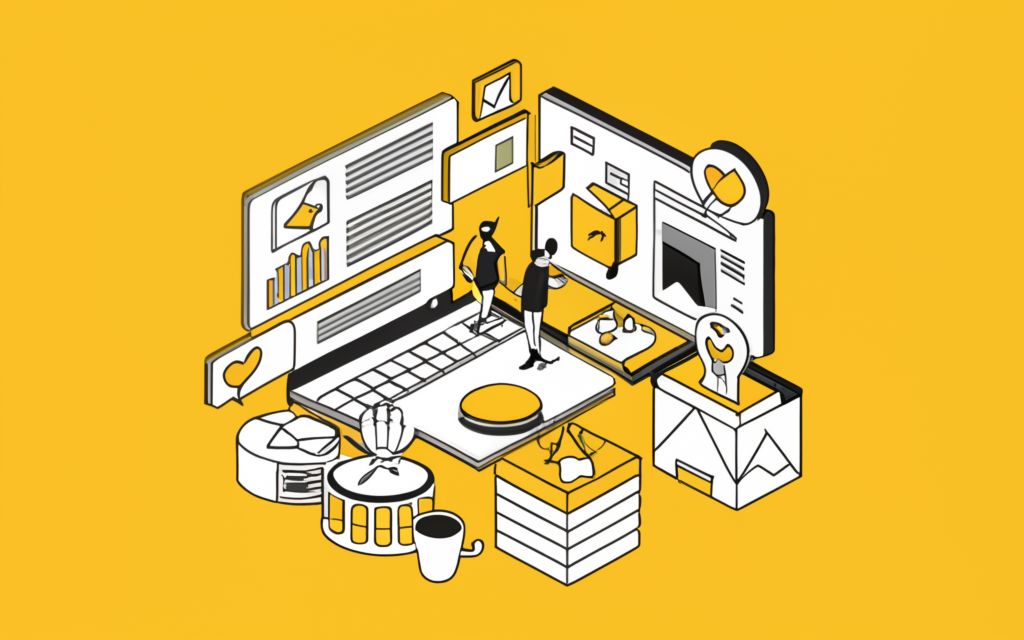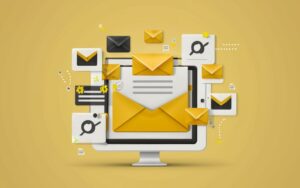Entering the job market is akin to navigating a labyrinth full of recruiter traps, company culture quirks, and the ever-dreaded hiring process intricacies. Among these challenges, one minor detail is often undervalued: the subject line of the thank you email after an interview. Yes, the humble email subject line. To the uninitiated, it might appear just as a small piece of the entire professional email puzzle. In reality, however, your post-interview avenue of communication, especially the initial snapshot visible in the interviewer’s inbox, can make or break your job prospects.
Why is the Subject Line Simplicity Crucial for a Thank You Email After an Interview?
Phrased rightly, the subject of your thank-you email can charm the hiring manager out of their wits. But how? Imagine reading ‘Excited Junior Web Developer Grateful for Unfolding Path at XYZ’ instead of the usual ‘Thank you for the interview, Recruiter’s Name’. The first choice, albeit more creative, may end up overcomplicating your message and making you look too desperate or overbearing.
Key Elements of a Simple Email Subject Line
A simple thank you email subject line could comprise the job title you interviewed for, your name, and a brief thank you note. Straightforward and personalized, it works because it’s easy to identify in an overflowing inbox.
How Over-Complication Can Hurt Your Post-Interview Email
Enthusiasm is a good virtue to have. However, it’s essential not to overdo it or push it into the interview thank you email’s subject line. The risk: the recipient might find it off-putting or unprofessional.
Best Practices for Creating a Subject Line for Interview Thank You Email
Strike a balance between professional and friendly. Mention company name, reference the interview process and always, always make it sound genuine.
Using Proper Etiquette: Is It Necessary to Write a Formal Subject Line?
You need not sound robotic to appear professional. Rather your tone in the email subject line should be reflective of the company culture and the rapport you established with the interviewer.
The Importance of Tone in a Thank-You Email Subject Line
A perfectly written thank-you not only addresses the recipient appropriately but also subtly reinforces the discussed conversation in the interview.
Formal vs. Informal Approach: What’s Right for Your Email After a Job Interview?
Knowing when to use a formal or informal tone largely depends on the industry, company culture, and your rapport with the hiring manager.
What Happens When You Ignore Etiquette in a Post-Interview Thank You Email?
For starters, you might relegate your email to the ‘ignored’ section of the hiring manager’s cluttered inbox. Worse, this lack of courtesy could cause them to reconsider their decision if you were a favorite.
Can Highlighting Qualification in the Subject Line Improve Your Job Interview Odds?
It’s a tightrope walk, my dear jobhunters. Where one might perceive it as assertive, another might find it braggart, especially if it comes across as though you believe you’re entitled to the job.
The Risk of Sounding Arrogant in Your Interview Thank You Email Subject Line
Carefully phrase your subject line to include your qualification without sounding condescending or pretentious.
Effectively Expressing Your Qualification without Sounding Braggart
Use a subdued, modest tone. It never hurt anyone. Maintain a positive and humble tone while subtly reminding the interviewer of your potential contribution to their company culture.
How to Correctly Send a Thank You Email After a Phone Interview?
Sending a thank you email after a phone interview is similar to an in-person one, with a few nuances thrown in.
How to Craft the Perfect Interview Thank You Email for a Phone Interview
Start with appreciation for their time and consideration, mention something you discussed in the interview and reiterate your interest in the position.
Why is the Subject Line Even More Important After a Phone Interview?
It’s simple! In a phone interview, body language and personal interactions are missing. So, your thank you email after the interview becomes an instrumental way to express your personality and interest.
Top 3 Best Subject Lines for Thank You Email After a Phone Interview
‘Thank You, [Interviewer’s Name], for the rewarding conversation!’, ‘Grateful for the chance to learn more about [Job Title] at [Company Name]’, and ‘Looking forward to hearing about the next steps, [Interviewer’s Name]’
Mistakes to Avoid When Writing the Subject Line of Your Post-Interview Thank You Email
Persuasive writing doesn’t involve pushing your desperation across. It means smartly packaging your qualifications, experiences, and interest.
Common Pitfalls of Email Subject Lines
Lenghty sentences, lack of personalization, grammatical errors- these are the usual suspects that recruiters might not appreciate.
How to Reiterate Your Interest Without Being Pushy in the Subject Line
Refrain from using phrases like ‘Waiting to hear from you soon’ instead use ‘Excited about the next steps’.
Practical Tips for Writing the Perfect Interview Thank You Email Subject Line
Stay true to your personality, respect their inbox, maintain a level of professionalism, and keep it succinct and clear. Your subject line should reflect both your appreciation for the interview and your interest in the job.
Remember, with each ‘send’, you’re forwarding a part of your professional persona into the digital realm. Let it reflect your best attributes. And yes, occasionally, reaching out on LinkedIn instead of by email might also do the trick. Happy Job Hunting!
###
Q: How should I write a thank you email after an interview?
A: Writing a thank you email comes down to expressing your gratitude sincerely and professionally. Include the following; a thank you for the interview opportunity, reflection on something you learned or appreciated from the meeting, and affirmation of your interest in the role. Remember to keep it short, sweet, and within 24 hours of the interview. Here’s an example: “Dear [Name], thank you for taking the time to meet with me today. I enjoyed learning about the [Role]. It’s best for my skills and experience. I look forward to hearing from you soon.”
### ###
Q: What should be the subject line in a thank you email after an interview?
A: A concise yet informative subject line is vital for a thank you email after an interview. Include your name, the job position, and the word ‘thanks’. For instance, a subject line might look like this: “Thank You – [Your Name] – [Job Position]”. Remember that a forgettable or missing subject line can lessen the impact of your gesture.
### ###
Q: How quickly should I send a thank you email after an interview?
A: The email after your interview should be sent as soon as possible – typically within 24 hours post-interview. Keep in mind that your timeliness showcases your attentiveness and commitment to the job. The early thank you note shows respect for the hiring manager’s time as well.
### ###
Q: Are there any common mistakes job seekers make when writing a thank you note after an interview?
A: Yes, common blunders include delay in sending the thank you note, inappropriate subject line, lack of personalization, including grammatical errors or typos, forgetting to reiterate their interest in the role, and sounding overly desperate for the job. Crafting a professionally sound, sincere, and personalized thank you note is vital for making the best impression.
### ###
Q: Do I need a template to write a thank you email after an interview?
A: While a template can give you a good starting point, ensure you personalize your thank you email for each job interview. The hiring manager will appreciate a heartfelt note, rather than a boilerplate message. It’s best to draw on specifically discussed subjects or shared experiences during the interview to establish a personal connection.
### ###
Q: What tips can you give for a short thank you note after an interview?
A: Keeping your thank you note concise is key. Make sure you appreciate the interviewer’s time, highlight a conversation point from the interview that was important, reiterate your interest in the position, and express expectations for the next steps. Remember, short and sweet makes for an unintrusive yet warm gesture after an interview.
### ###
Q: How do I write a thank you email after a second interview?
A: Much like the first interview thank you note, your second interview note should also incorporate gratitude, interest in the role, and a highlight of the interview. However, since it’s a second interview, you could delve slightly deeper into why you believe you’re the ideal fit for this role, or discuss new touched upon topics in this interview. Once again, send your thank after the interview promptly.
### ###
Q: Do I need to send a thank you email after an informational interview?
A: Yes, it’s recommended and appreciated to send a thank you email after an informational interview. It’s a thoughtful way of expressing your gratitude for their time and the valuable insights they provided, which could prove helpful in your job search. The guidelines remain largely the same—keep it professional, appreciative, and send it off within 24 hours.
### ###
Q: Can you give me some subject line examples for a thank you email after an interview?
A: Sure! Here are some interview subject line examples: 1. “Thank You for the Great Conversation – [Your Name]” 2. “[Your Name] – Thank You for Your Time” 3. “[Job Position] Interview – [Your Name] Thanks You!” Remember, an efficient best thank you email has a clear and relevant subject line.
### ###
Q: Does a thank you note after an interview really make a difference in my job application?
A: Indeed! A thank you note might seem like a small gesture, but it’s actually a powerful tool in leaving a lasting positive impression on your interviewer. It illustrates that you spent time reflecting on the interview, that you’re genuinely interested in the role, and most importantly, it’s a clear demonstrate of your professionalism and good manners. While it might not make or break your application, it certainly gives you an edge over candidates who don’t send one.
###




